Apr
14
WHEN STATISTICS ARE WRONG
Filed Under Tears of a Warrior, Vietnam Today | Comments Off on WHEN STATISTICS ARE WRONG
by Janet J. Seahorn, Ph.D
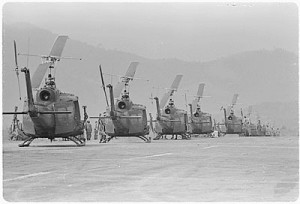
Ok, I’ve been duped and I am not too happy about it. Several of what I thought were reputable websites have been taunting for years that only about 1/3 (850,000) Vietnam veterans were still living. I must it admit it was an unbelievable number which is why I checked it out with other sites to confirm. Turns out all of these sites were wrong, DEAD WRONG!
This weekend Tony and I received his Vietnam Veteran’s of American magazine (March/April 2011). In an article, Not Dead Yet: Mortality Rates Among Vietnam Veterans, Patrick Brady explains where the misleading statistic originated and what the real numbers are… as far as anyone can estimate. It seems the polluted numbers came from a nine-minute video originally posted on YouTube by a group called Veterans Appreciation Alliance. What makes this even crappier is the group was “seeking sponsors and contributions for its Grateful Red, White, & Blue Appreciation Tour” (Brady, p. 29 March/April 2011). This is a pretty despicable way to prey on the hearts and minds of patriotic Americans and makes me even more annoyed. The group’s various websites (yep, they had more than one to capture audiences for their fund rising), even used the Naval Health Research Center as one of its resources. The Center was totally unaware of what was occurring. By the way this particular source was one reason I thought the data was accurate.
So where did this MYTH first originate; according to Brady it came from a phony website, The American War Museum, which seem to disseminate “much false information for reasons only its originator might know” (VVA, March/April 2011). A different site, The American War Library, appears to be run by another one man operation in California by the name of Phillip R.Coleman. Looks as if Mr. Coleman has over two dozen alias such as Otis Willie and Roger Simpson. Yikes!
Now, for the good news according to the Center for Disease Control: “In-country Vietnam veterans accounted for about a third of all Vietnam-era veterans, and if they were dying only slightly faster than the others (veterans serving in the military but not in Vietnam), then the 800,000 era veterans who died from 1960s through 2000 should have included fewer than 300,000 in-country veterans” (Brady, pp. 29-30, March/April 2011). What this really means is only around 325,000 to 350,000 out of 3,566,000 Vietnam veterans serving in-country have died, versus over 2.5 million. Quite a discrepancy in the number of deaths.
Appears many of us were duped by deceitful websites using fancy patriotic names. Thanks to the excellent article by Mr. Brady, I’ve learned my lesson. I am a little wiser, a bit less trusting, and a lot more aggravated at those who try to capitalize on the goodness of others.
Mar
31
STEALING SPIRITS
Filed Under Combat PTSD, Human Rights, PTSD, Tears of a Warrior, Wisdom | Comments Off on STEALING SPIRITS
by Janet J. Seahorn, Ph.D

Last week we did a ten day road trip through Colorado, New Mexico, Arizona, and Utah. One place we visited was Monument Valley, a beautiful, hauntingly desolate landscape of red sandstone formations rising up from the thirsty valley floor. This region is a sacred Indian worship site belonging to the Dine tribe. Many sacred locations remain private for ceremonies held by Navajo tribes along the Arizona & Utah border.
Although the valley has been open to the public for decades, I still felt reluctant to enter its sacred domain. It felt somehow like I was stealing a small part of the land’s spirit by just being there. This ground is special to the Navajo Nation, a culture that outsiders can never fully understand or appreciate. The beauty of the land itself is breathtaking. The ancient spirits rustle in the wind.
John Ford was the first major director to film his movies in the Monument Valley area. The film, Stagecoach, starring John Wayne won an academy award. Many more successful movies followed, all of which brought money and jobs along with more people to the valley. The many films with their striking scenery contributed to a rise in visitors who wanted to view the landscape first hand.

The swarms of tourists came like bees flocking to a new food supply. Only these human insects did not make honey, or contribute to the well-being of the people beyond their money. This is what made me begin thinking again of PTSD. So many common experiences lead me to reflect again on PTSD and its relationship to man’s survival. It is deceptively easy to steal a land or a human spirit. It is a simple recipe – simply take his land; take his dignity; take his humanity, and take his hope. Take his happy memories and replace them with tears and broken lives. By all of the taking, eventually we take his reason for living; we leave behind mangled hearts and broken spirits.
Stealing Spirits is a tragic feat. Preserving them is as necessary as breathing. Each heartbeat is a promise of a new beginning, a new hope, a new and fresh tomorrow – for Spirits are the keepers of our past, our present and our future contributions. They can be shared and nurtured, but they must never be stolen.

Mar
25
LOST IN WAR
Filed Under Tears of a Warrior, Today's War, Trauma, War | Comments Off on LOST IN WAR
by Janet J. Seahorn, Ph.D
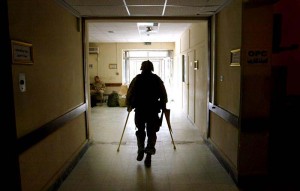
In our book, “Tears of a Warrior: A Family’s Story of Combat and Living with PTSD “, one chapter talks about the “Humpty-Dumpty Effect”. Most people know the children’s nursery rhyme where the poor egg falls off a wall and breaks into numerous pieces that can’t be put back together again. For a veteran, war can be the culprit that pushed Mr. Dumpty off his perch. In our civilian culture we might try and sue for all a person is worth, however in war there are too many different elements to specifically place the blame of a broken body.
The underlying analogy of Humpty-Dumpty is what he lost when he fell and cracked his inner and outer shell. The major damage may be a lost sense of wholeness. One goes into combat young and feeling invincible and often returns in pieces. Pieces when put back will take super gorilla glue to hold together, while some pieces many not mend regardless of the care applied.
Searching for those lost pieces may become a never-ending journey. Putting back the broken eggshells of the body, mind, and heart can be a life-time challenge. The delicate part of the process occurs unexpectedly when hidden memories, ghosts of conflict, and unresolved grief overtake Humpty and rescrambles his being, again and again. It can be a daily occurrence for many vets and their families, and sometimes, in attempting to put the pieces back, we run out of glue.
Finding what was lost in war may be a pointless pursuit, like looking for a coin in a vast sea of sand and rock after it has fallen off a steep cliff. One will never fully retrieve his/her sense of innocence. He will never regain that youthful sense of invincibility known prior to combat. She will never view the world like she did before looking at scenes of devastation, death, and the severely wounded. The security of childhood has been turned into the reality of a sometimes cruel and inhumane world. A world that is different for the veteran than for people back home who have never witnessed war’s bluntness.
Perhaps Humpty may never retrieve or replace his lost pieces or restore the wholeness that existed before war. Yet, being pasted back may bring together a renewed sense of purpose and personal aspirations. Mosaic eggs have their own unique beauty. A beauty that cannot be replicated for each section of the egg is placed in a distinct part of what was once a solid structure. With enough care and support, the shell can once again become sturdy and uniquely whole. As for me, while I am using the sticky stuff, I think I will put a generous sprinkle of glitter and gold that will enable the sunlight to reflect the new dimensions of the outer and inner egg shell.
Maybe our veterans’ youthful wholeness was lost. We will surely grieve its purity. Yet, do not refrain from celebrating the physical and emotional strength of the new Humpty-Dumpty. He, in his full glory, is not lost, only remolded into something with greater substance, courage, compassion, and hopefully a whole lot of sparkle.
Mar
17
AGING WITH TRAUMA
Filed Under Aging, Healing Waters, Life, PTSD, Tears of a Warrior, Trauma | Comments Off on AGING WITH TRAUMA
by Janet J. Seahorn, Ph.D

Yikes! When we read about the Golden Years they don’t always seem so wonderful. Most of you have read that old saying, “aging is not for sissies”, and that cliché was written for the average person who has a lighter set of luggage to carry. For veterans and their families, many don’t carry bags of crap; they have a huge trunk of it, and it doesn’t seem to get lighter with time.
For almost two years I have resisted writing this particular blog. Why? Because it scares the #### out of me. I admit it; I am a sissy for growing old. Not because I am afraid of needing an expensive face lift, or having to wear fancy old people diapers. OK, those things do concern me, but they aren’t nearly as distressing as the more intrusive symptoms of age. Now, add the effects of living a lifetime suffering with PTSD or living with someone with PTSD and the image gets uglier. Even strong, rose colored glasses haven’t been able to calm my apprehension. Therefore, it is time I write what I know, and have known for a very long time. Aging with trauma is not for fragile minds or bodies.
Here are some facts that have been around for a long time regarding aging and PTSD.
- People with type 2 diabetes who also suffer with PTSD face a 36% higher risk of going blind or developing kidney disease (American Diabetes Association).
- Heart problems and high blood pressure are more common — DUH!
- Mood disorders such as depression are more prevalent if one has not sought help. Double Duh!
- Depression increases the risk of heart attack by 25% (VFW, March 2011)
- Alzheimer and/or dementia increases.
We have long known that PTSD affects the body and the brain, so it is not a big aha that any of these conditions gets worse with age since the body’s immune system is weakened and not as robust as when we are young. In giving all of these amusing statistics, I can’t stop without putting in some actions that will prolong the drought of age. Again, we all know these but sometimes do little to practice what know. Call it lack of well-power or procrastination, the two twins of sin.
- 1. Exercise everyday. This promotes blood flow to the brain which is pretty darn important for keeping the feeble thinking and crippled rascals at bay. It also increases muscle mass and strengthens bones keeping us from being in a wheel-chair instead of on a ski lift.
- 2. Watch what you eat… “What’s on your plate determines your fate.” Damn, I love a warm, gooey chocolate donut, a double scoop of ice cream, or a basket of salty French fires, and they seem to love me, my thighs and clotted arteries just as much.
- 3. Drink lots of water. It is the best purifier of the body and removes all that excess material, especially sodium that helps lower heart pressure.
- 4. Practice deep breathing and meditation. Lots of research shows how these actions promote a sense of well-being… only problem is my lack of concentration. Practice makes this better and really does improve the entire mind/body.
- 5. Add more fiber to your diet. J I don’t think I need to go into detail with this one, but fiber literally will help lighten our trunks of crap.
- 6. Get plenty of sleep. Nothing can take the place of rest for promoting good health.
- 7. At least I can still have my lattes and tea… at least four hours before bedtime.
- 8. Oh, and don’t forget laughter, it is the best of all exercises for our mind, our bodies, and our hearts.
Aging is inevitable, but aging with grace and good health will take courage, will-power, and making good personal choices.
Mar
9
UNCOVER THE SUN
Filed Under Combat PTSD, PTSD, PTSD treatment, Tears of a Warrior, Today's War, Treating PTSD | Comments Off on UNCOVER THE SUN
by Janet J. Seahorn, Ph.D

There are so many ways to experience trauma in the world. Combat is just one, but it is one where the impact keeps on giving and giving. For many whose painful experiences occurred once or twice, many seem to be able to get up in the morning and feel grateful for the opportunity to have a fresh new start. The sun shines brighter and the colors of the world are more intense, even if some nights are seemingly unbearable.
The difference between a one time experience and multiple traumatic occurrences is the cumulative effect. The more often an individual faces harrowing life events, the more likely the brain is going to be influenced by those events. Because the brain is sculpted by experience, everything good or bad can make a difference.
We become who we are due to our genetic foundations and our environment. If that environment is nurturing, safe and challenging in a positive way, we have a greater chance to develop into self-confident, cheerful people. If, however, that environment is saturated with violent, unpredictable and dangerous circumstances the brain molds itself into a survival organism in order to hopefully sustain the trauma. The important thing to remember, however, is the age when a trauma occurs. Earlier is not always better.
We know the brain is not fully developed until the mid twenties (especially in males). So what do you think multiple combat deployments do to a developing brain? For many young men and women the outcome is pretty darn complicated. Connections within the brain are changed. Neurotransmitters, those chemicals in the brain that allow us to feel pleasure, prepare for fight or flight, suffer with depression, and other human experiences are changed. The physical organism that controls our behavior is changed. Trauma is serious business with serious effects for many.
For warriors returning from combat, the world is not as bright and welcoming as it was before war. Sense of identity is changed… you leave as a somewhat naive youngster and return as an adult aged beyond your years. PTSD is like having a gray veil placed over the sun. Sure it still shines. Yes, you can feel the warmth of its rays.
Yet, nothing is the same as before you left. Healing from trauma can be the unveiling of the sun. The way to remove that shroud or at least make it lighter is to seek help as soon as possible. You have the strength to Uncover the Sun. More importantly, you deserve to have the full brightness of its rays lighting your days and warming your heart.
Feb
28
BEFORE YOU GO — THANK YOU
Filed Under Tears of a Warrior, Veterans | Comments Off on BEFORE YOU GO — THANK YOU
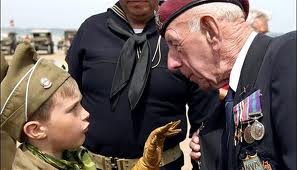 It came in an e-mail this morning. I hadn’t seen it before, which made it all that more special.
It came in an e-mail this morning. I hadn’t seen it before, which made it all that more special.
Often we have written and spoken about the need to thank our past and current military veterans and families for their sacrifice and service. Their selflessness has offered the rest of us a comfortable and safe way of life that many people in other countries have never experienced. Just listening to the news the last few weeks regarding events in Egypt, Libya, even Morocco have left us even more aware and grateful for the many freedoms and blessings we have as Americans.
To all veterans who have protected our freedoms, we thank you! Thank you again for your dedication to Freedom. Thank You for your service to our country and its people, many who sometimes may seem to forget that while you were in a foreign land fighting, they were home enjoying the comforts of their daily lives.
In defense of the average person, I believe it is not because they don’t care; it is more that you did such an amazing job of protecting our rights and you did it so quietly with humbled humility that few seemed to notice. Yet, for many, gratitude is present deep in the heart if not consciously in the mind.
Therefore, we thought our readers might enjoy this small tribute that touched our hearts and reminded us again how indebted we are to military service.
If you know of someone who has served, make that effort now to say Thank You.
Tomorrow may be too late, so do it “Before They Go”.
Please view and honor the veterans represented in both videos:
WWII & Korean War Veterans
http://www.beforeyougo.us/play_byg
Vietnam War Veterans
http://www.beforeyougo.us/play_byg_vn
Feb
22
Community Event
Filed Under American Patriotism, Human Rights, PTSD treatment, Tears of a Warrior, War | Comments Off on Community Event
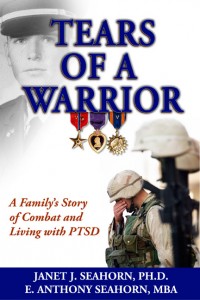
Thought you may be interested to know the Richfield, MN Human Rights Commission is using our book for a community event.
We are very please to learn that “Tears of a Warrior” is generating interest from the general public!
Click on website:
http://www.startribune.com/local/west/116500038.html
Feb
15
WICKED PROBLEMS
Filed Under Combat PTSD, PTSD, PTSD treatment, Tears of a Warrior, Trauma, Treating PTSD, War | Comments Off on WICKED PROBLEMS
by Janet J. Seahorn, Ph.D
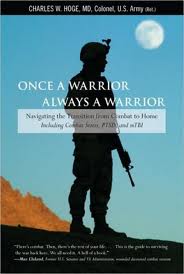
No doubt about it, PTSD is a very Wicked Problem. Wicked Problems, by definition, are those dilemmas that cannot be solved easily by using a typical approach. Anyone living with traumatic stress, especially those pressures caused by combat, will attest to the challenges of trying to solve the predicament of moving through his/her life carrying the memories and phantoms of war. If the solution was easy, it would have been found centuries ago. Yet, here we are today, in 2011, and the Wicked Problem still exists.
One of the Wicked Problems of trauma is surviving the depression that can be a part of the conflict. How does a person live with long-term depression that often becomes the new normal after battle? Constance Gibbons, one of our readers, wrote last week and shared how depression has been the new normal for many vets including her husband. After years of having it a part of their daily being, it becomes their after war identity. She stated: Another interesting aspect from those of us observers – spouses, et al – was that universally we noted the levels of sort of a baseline enthusiasm, whereas, the vet thought they were quite fine.
She explained further: As you continue to think of ‘depression’ as it may be portrayed by the vet, maybe think of a sense of resolution, unknowing acceptance, somewhere in a lower zonal level (between overconfidence and fear) from the years of living on the cusp of life and death, at a level of continuing risk so great that without the impact of the continuing penetration, after, into youthful vulnerability, it appears to those of us in observation to be baseline depression…where it is not to the vet; just an absence of heightened stimulation. Wow, now how would anyone solve such a Problem?
Veterans carry many Wicked Problems – ghosts of death and shocks of battle, memories that make if difficult to stay grounded in every day activities, and struggles to avoid the sleepless nights where staying awake is one way to keep the dreams of foreign battles from returning. New therapies and medications have helped lower the impact of PTSD but it has not solved the Problem. I read many blogs and articles relating combat PTSD to the trauma that the average person might experience. Things such as car accidents, rape, assault… all which are terrible and difficult to cope. Yet, these are hard to compare to combat where trauma occurs every day, often numerous times in a day. One of the biggest differences is besides being the prey, in combat you must also become the predator. Instead of being involved in one brutal injury or death, you may experience many.
Fighting the Wicked Problems of war takes work. It requires listening to your gut feelings as well as how others around you perceive your behaviors. The good fight involves muffling the loud voices in the head long enough to examine realistic solutions. Perhaps there will be no absolute solution to PTSD, but every day there are warriors who conquer their demons and live full and meaningful lives. Wicked Problem you may remain, but you will not take more of a warrior’s life than you already stole. You will not win this internal war, even if you succeed in taking an emotional battle now and then. You see, Wicked PTSD Problem, in spite of your persistent, you are no match for the courage and willpower of a WARRIOR.
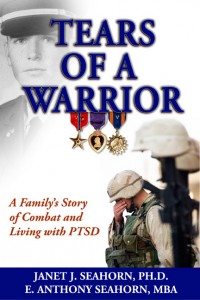
Feb
2
A HUMBLED JOY
Filed Under American Patriotism, Civilian life, Combat PTSD, Family, Life, Love, PTSD treatment, Tears of a Warrior, Treating PTSD, War | Comments Off on A HUMBLED JOY
by Janet J. Seahorn, Ph.D
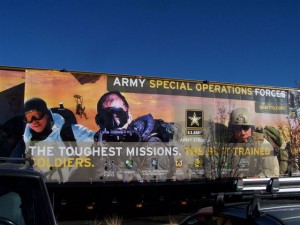
They stood before us, this beautiful, young couple. He had just returned home from a tour in Afghanistan, his second time away. They had many things they could have done that would have been much more fun than taking time to visit with us.
She was a student in my fall semester course at the University. At the beginning of the new semester she let me know her husband would be returning home soon and she wanted Tony and me to meet him. Just the request was a humbled joy. Actually meeting them on that cool winter day even meant more.
During our short time together, we did not talk much about his experiences at war except to listen to a few short phrases indicating he had been in some difficult situations.
I didn’t mention that his wife had to take an “Incomplete” for the college course because she became seriously ill and spent several days in the hospital. Somehow, all of this was now unimportant. The only thing we noticed was how the two people standing before us just couldn’t stop smiling and giggling continually as they held hands, grateful to finally be together.
My goodness, this was truly the picture of humbled joy.
That same day we spoke with an army Special Forces warrant officer who was helping to show students on campus the various skills and equipment used in the military. The young man explained that he had been in the army for sixteen years, joining-up right after high school. Honestly, he didn’t look like he was that old; he smiled widely when I shared my observation with him.
He talked about how joining the military at age seventeen was the best thing he has ever done. The army, he noted, gave him direction, guidance, and supported his development as a confident adult. The interesting detail about our conversation was how much I learned in a short time about his confidence as career military person.
At the beginning of our chat I asked how many times he had been overseas; five – six times if you counted a stint in Romania. The duration of each tour was between three and eight months depending on the mission. During several of his assignments he experienced the reality of war, including several casualties within his unit.
Yet, in spite of the stress, he seemed to be coping with the emotional and physical side effects of combat pretty well. It was challenging, he noted, to reintegrate into “normal” life on each return home, but the army gave him plenty of support and time to decompress.
He pointed out that on several occasions he was given a lengthy mental survey of over 115 items which sometimes highlighted his PTSD tendencies. Nevertheless, because he was career army, his adjustment process appeared to be faster and more comprehensive than veterans who left the service shortly after returning from battle. There does seem to be some significant benefits for the men/women who are in the military long term.
Perhaps being in a community of individuals who have experienced similar battle conditions helps the healing and understanding process. Being around other soldiers who can identify with the pain of combat; others who quietly appreciate the sacrifice of serving our country may lessen the feelings of emotional trauma of being alone in a world where most people haven’t experienced war. This, by itself, would be an immense relief because one wouldn’t have to pretend everything is OK when it isn’t. You wouldn’t have to go through each day feeling lost and alone because there would be a band of brothers surrounding you with knowledgeable support. At any rate, this young soldier certainly gave me some things to think about.
Humbled Joy, invisible, yet real. Thank you.
Jan
26
HIDDEN IN PLAIN SIGHT
Filed Under Combat PTSD, Life, Peace, PTSD, TBI & PTSD, Tears of a Warrior, Trauma, War, Wisdom | Comments Off on HIDDEN IN PLAIN SIGHT
by Janet J. Seahorn, Ph.D
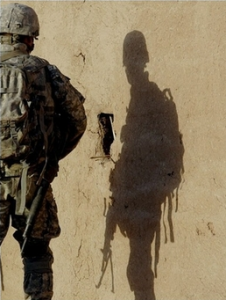
There is a phrase that one hears every now and then, Hidden in Plain Sight. Four simple words that eloquently reveal the complexity of the impact of trauma on one’s mind, heart, and soul. We see the person; we look at the eyes, the body language, the being’s form. The suffering is present in plain sight for all to witness. Yet, few do, lacking the keen observational heart skills required to notice anguish.
There are days I wish I didn’t see it – the faces of children battered by abuse and neglect; the adolescent’s depressive absorption into the ugly world of alcohol and drugs, and the veiled, but ever present ghosts of veterans, young and old carrying their memories of war. They haunt me as the world moves around their pain because it is hidden in plain sight.
Much like ‘Don’t Ask, Don’t Tell’, we are a nation that prefers to maintain our equilibrium at all cost. We tend to be uncomfortable with sorrow even when it stands knocking at our front door asking only for recognition and a bit of compassion.
We say we are a nation of empathy, yet often dismiss the humanity that exists in every person, especially those with whom we don’t agree. We argue we are intelligent, proficient thinkers, yet fight rigorously to disqualify any information that does not align with our personal paradigms/beliefs, whether true or misleading, without accurate evidence or data.
The answers to our current and future problems are available, but for too many they are hidden in plain sight. It will take incredible courage to look into our own minds and hearts searching for what is right and true. It will take courage and honest self-reflection to heal the hidden wounds of the wounded, but it can be done. What lies before us does not need to consume us with fear or apprehension. When confronted, trauma and pain can be overcome and no longer hidden or carried alone.
Light and sunshine are incredible healers.

